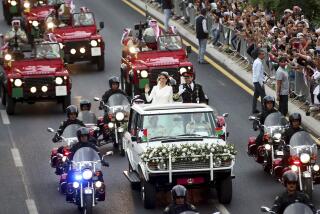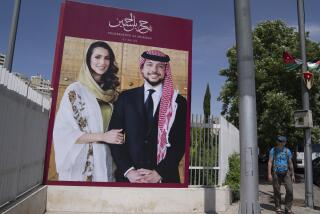No Problem Too Small for Bahrain’s Ruler and His ‘Big Family’
- Share via
MANAMA, Bahrain — It is 7 a.m., and Sheik Isa ibn Salman al Khalifa settles into a big chair at the head of a room the size of a basketball court. Seated on sofas that line the walls are 150 or more men who have arrived without appointments and have entered the royal court without any security check.
Each carries a written petition that expresses a request or a grievance, and each, in the brief audience with Sheik Isa, the ruler or emir, will have his wish granted or his complaint answered.
An old man comes forward and hands the emir a note saying he needs a house. Granted. Another petitioner is having trouble with the bureaucracy getting a driver’s license. Isa nods to an aide, indicating that he is to take care of it. A third wants help settling a business dispute with a cousin. Again, a nod.
Sheik Isa is the 11th in the line of Khalifas who have ruled Bahrain since it was seized from the Persians in 1783. Now 52, he was educated by private tutors and can remember when the only transpoSheik Isa ibn Salman al Khalifa rtation on this island of 225 square miles was by camel.
Isa holds a public audience, a majlis , every other day. After this one, sitting in his office, he is politely taken aback when a visitor asks if a head of state should devote so much time to mundane matters that in the West would be handled by a junior clerk.
“Of course,” he answers. “We are a family here, a big family, and I want to know what my people’s problems are. If something is wrong, I want to correct it.”
To the Arabs of the Persian Gulf states, this is the essence of desert democracy. It is a unique form of government, both in the way it is practiced and because, unlike other traditional ways of governing in the developing world, it was not crushed by colonialism.
The early history of the gulf is the history of tribal peoples wandering out of Iraq and Saudi Arabia and of warring family clans, in many cases interrelated. The Khalifas of Bahrain, for instance, are cousins of the Sabahs who rule Kuwait. In Qatar, most of the major families are related, and it is said that if one of the ruling Thanis gets a nosebleed, every other nose in the country bleeds as well.
Families have acquired and held power by means of military strength and have made deals with other families by the same means. A proverb has it that “there is only gold or the sword: if you are my friend, I will shower you with gold; if you are my enemy, there can be only the sword.” There is nothing in between.
So the tribe came to symbolize strength and heritage. The heart of the gulf political system remains tribal in that every man has direct access to the ruler, whose final word is definitive and whose largess filters through the society.
Sheik Isa, for example, has a Cabinet of competent, educated ministers, but such institutions as city halls and parliament do not exist. Democracy is achieved not through consensus but through the belief that the emir reponds to his people’s desires and acts in their best interest.
Bahrain’s Parliament was dissolved in 1976 (“All those wild promises candidates have to make weren’t in anyone’s interests,” a Cabinet minister said), and most Bahrainis apparently have no great interest in reviving it. Kuwait now has the only Parliament in the gulf region, but only the 3% of the population that can trace their roots back to 1921 are allowed to vote. Still, everyone has shared in the benefits of the oil wealth, and healthy economies do not produce much clamor for change.
“We have tried, with success, I think, to develop a middle class,” said Bahrain’s information minister, Tarik Moayyid. “We don’t want anyone feeling he doesn’t have a stake in the stability and prosperity of the country. We don’t want anyone to feel he has nothing to lose if there is a change.”
Bahrain--and the gulf region in general--are in a way unusual. In other parts of the Arab world, many people view their leaders with distrust, but here the emirs and sultans are respected, and they are likely to reflect, rather than set, the tone and mood.n
Only one gulf ruler, Sultan Kaboos ibn Said of Oman, shuns the majlis, believing that it is a general waste of time. But even he spends two or three weeks every year traveling around his country and living in tents, to take the pulse of his people.
Political analysts suggest that this personal approach to government works in the tradition-minded gulf because populations are small. Bahrain, for example, has only 360,000 inhabitants. The danger, they say, is that this approach ensures the rigidity of political structures; they note that although the oil boom brought tremendous social change, it did not lead to a single significant political reform.
Whatever the drawbacks, this style of government is easygoing. Bahrain’s Cabinet ministers drive their own cars and have no escorts or security guards.
Sheik Isa is relaxed and without pretense. He thinks Arab unity is fine, but he is not obsessed by it. He is concerned with settling the Palestinian problem but maintains a certain distance from it. He is close to the United States and believes that his country should not fear Western-inspired concepts of modernity.
On weekends, he opens his private beach to Europeans living here, calling out to them to join him on his patio for soft drinks and cake. Always his first question is, “What do you think of Bahrain?” Once he was asked why he spends so much time at the beach, and he answered, “I exercise my neck looking at all the pretty women.”
“Tell me, Ali,” he said recently to an Egyptian journalist, “what’s the latest joke from Cairo?”
The reporter stammered and said it was a bit off-color, but the emir nodded; he would hear it anyway. Midway through it, Isa broke in with the punch line and said: “That’s an old one. Any others?”
The emir’s style--simple, direct, a mixture of tradition and modernity--has helped shape Bahrain’s future. Although its oil reserves are relatively modest, Bahrain has been transformed into the Singapore of the Middle East, a major banking, service, communications and transportation center. Nearly 160 banks, including major U.S. and European houses, operate here. Thousands of Western businesses use it as their Mideast base of operations.
The emir’s son, Sheik Hamed, 34, the defense minister and heir apparent, is thoroughly modern. An accomplished pilot, he was trained at Sandhurst, the British military academy, and at West Point.
“We try to be a friendly country,” the emir said. “What worries us is the trouble all over. Why can’t people just live together as human beings, as brothers, and get on with the business of making this a better world?”
More to Read
Sign up for Essential California
The most important California stories and recommendations in your inbox every morning.
You may occasionally receive promotional content from the Los Angeles Times.













